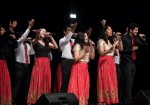This post was updated April 13 at 9:15 p.m.
A cappella teams from all over the country dueled on stage, performing a fusion of Western and traditional South Asian songs.
Sahana, a South Asian singing competition, welcomed groups from various states to the Ackerman Grand Ballroom on Saturday. The competition was hosted by a UCLA a cappella group titled Naya Zamaana, whose board members chose nine performers from 23 auditioning groups, said Rohan Desikan, the club’s director. Teams represented schools such as Purdue University, Stanford University and the University of Miami. Each team performed a 12-minute set consisting of songs and choreography while competing for first place. Their aim is to advance to the All-American Awaaz finals, an April competition dedicated to bringing together South Asian college a cappella groups from the country.
Desikan, a third-year electrical engineering student, said the Saturday competition was the club’s second time hosting the event, the first being in March 2018. Naya Zamaana has performed in many competitions over the years, but wanted to create its own event to support the South Asian a cappella scene, he said.
“We love giving teams a platform to showcase their talent, especially since Los Angeles is such a big city and (there are) so many South Asian people,” he said. “There are competitions in places like North Carolina where the South Asian following is definitely not as big, so we thought we should bring this (Asian) presence here.”
Just before each of the nine finalists performed, brief videos introducing each respective team and their schools played on stage. Throughout the sets, teams sang modern Indian songs, including tracks from well-known Bollywood movies, while also performing more traditional song styles like Carnatic and Hindustani music, Desikan said.
Events such as Sahana allow individuals to broaden their scope outside of Western a cappella and learn more about South Asian music, said Sarang Joshi, a board member of All-American Awaaz, and a former a cappella singer with the University of Washington.
“I think it’s great to see college kids doing what they love and bringing together parts of their own heritage with the South Asian influence as well as from the United States,” Joshi said. “It’s really great to see how we can represent our combined culture in musical form.”
Along with South Asian musical influences, teams also weaved in popular Western music, including songs by artists Ed Sheeran, Justin Timberlake and Zara Larsson. Within a team, one vocalist would perform a Hindi song while the other singer would perform an American song, sometimes singing them separately, and other times fusing the tracks together.
The event also included individuals working in the South Asian music industry. All four judges were music professionals, including third-year political science student and Indian-American playback singer Pragathi Guruprasad, whose voice has been featured in Tamil-language films.
Once the a cappella teams performed, UCLA South Asian dance groups Bataaka Nu Shaak and Taara took the stage, providing the judges with time to deliberate the winners, Desikan said. As the night came to a close, teams wearing traditional South Asian clothing with vibrant colors, beaded embroidery and scarves stood on stage for a beatbox battle.
University of Maryland’s a cappella team, Anokha, took home the grand prize of first place and a $1,000 check at the awards ceremony. Before starting their routine, the group had briefly stated some statistics about human trafficking and female victims. Anokha then performed songs in both English and Hindi, including “Survivor,” by Destiny’s Child. All their songs featured lyrics that were empowering to women, and segments of their choreography implied women gaining agency by, for example, leaving abusive relationships.
Toward the end of the event, performers from various schools represented onstage congratulated one another. This sense of community is strong within South Asian a cappella groups, said Ishan Saha, a second-year psychobiology student and creative director at Naya Zamaana. He said competing in events like Sahana and meeting other a cappella teams has been a highlight of his time at UCLA.
“It’s really cool to see how the South Asian a cappella genre is developing as a whole and how each school is developing its own distinct style,” Saha said. “It’s truly an incredible experience and I’ve loved every bit of it.”
